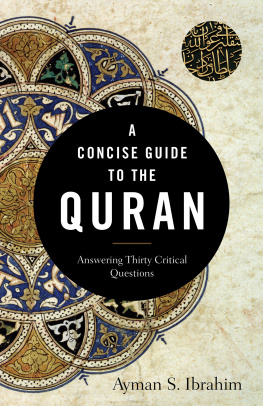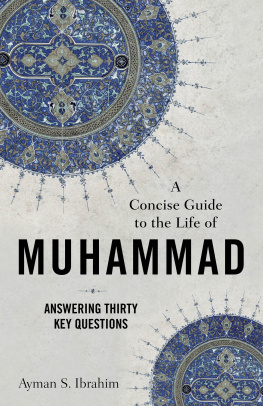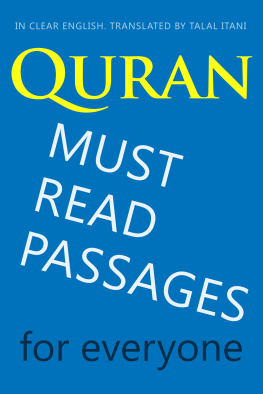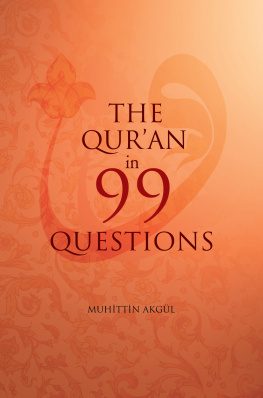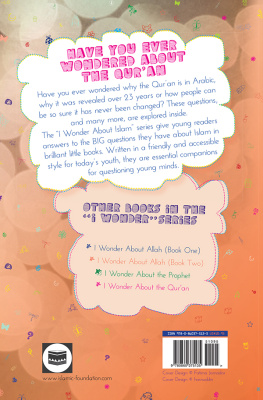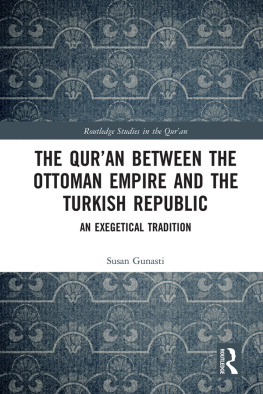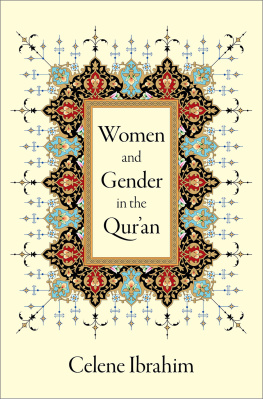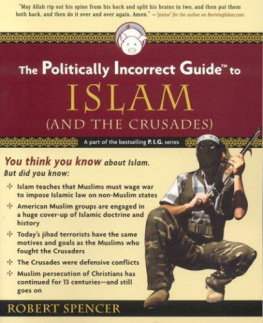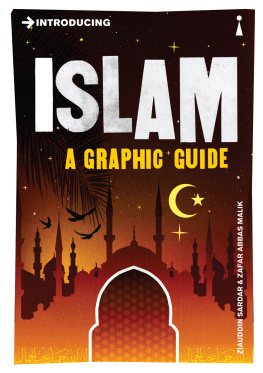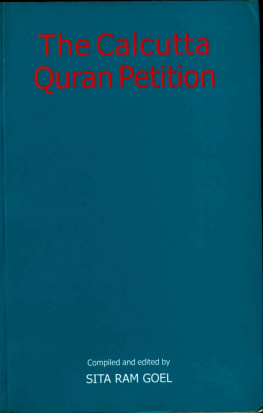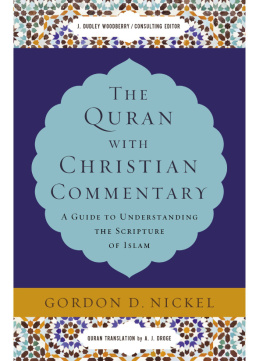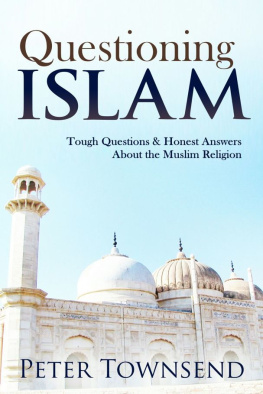Ayman S. Ibrahim - A Concise Guide to the Quran: Answering Thirty Critical Questions
Here you can read online Ayman S. Ibrahim - A Concise Guide to the Quran: Answering Thirty Critical Questions full text of the book (entire story) in english for free. Download pdf and epub, get meaning, cover and reviews about this ebook. year: 2020, publisher: Baker Publishing Group, genre: Religion. Description of the work, (preface) as well as reviews are available. Best literature library LitArk.com created for fans of good reading and offers a wide selection of genres:
Romance novel
Science fiction
Adventure
Detective
Science
History
Home and family
Prose
Art
Politics
Computer
Non-fiction
Religion
Business
Children
Humor
Choose a favorite category and find really read worthwhile books. Enjoy immersion in the world of imagination, feel the emotions of the characters or learn something new for yourself, make an fascinating discovery.
- Book:A Concise Guide to the Quran: Answering Thirty Critical Questions
- Author:
- Publisher:Baker Publishing Group
- Genre:
- Year:2020
- Rating:4 / 5
- Favourites:Add to favourites
- Your mark:
- 80
- 1
- 2
- 3
- 4
- 5
A Concise Guide to the Quran: Answering Thirty Critical Questions: summary, description and annotation
We offer to read an annotation, description, summary or preface (depends on what the author of the book "A Concise Guide to the Quran: Answering Thirty Critical Questions" wrote himself). If you haven't found the necessary information about the book — write in the comments, we will try to find it.
A Concise Guide to the Quran: Answering Thirty Critical Questions — read online for free the complete book (whole text) full work
Below is the text of the book, divided by pages. System saving the place of the last page read, allows you to conveniently read the book "A Concise Guide to the Quran: Answering Thirty Critical Questions" online for free, without having to search again every time where you left off. Put a bookmark, and you can go to the page where you finished reading at any time.
Font size:
Interval:
Bookmark:
2020 by Ayman S. Ibrahim
Published by Baker Academic
a division of Baker Publishing Group
PO Box 6287, Grand Rapids, MI 49516-6287
www.bakeracademic.com
Ebook edition created 2020
Ebook corrections 07.14.2021
All rights reserved. No part of this publication may be reproduced, stored in a retrieval system, or transmitted in any form or by any meansfor example, electronic, photocopy, recordingwithout the prior written permission of the publisher. The only exception is brief quotations in printed reviews.
Library of Congress Cataloging-in-Publication Data is on file at the Library of Congress, Washington, DC.
ISBN 978-1-4934-2928-8
Quotations from the Quran are the authors translation.
To my beloved friend Ali,
who loves Jesus greatly
and is still searching for him!
Cover
Half Title Page
Title Page
Copyright Page
Dedication
Acknowledgments
Introduction: My Earliest Encounters with the Quran
Part 1: The History of the Text of the Quran
1. What Is the Quran?
2. What Does Quran Mean?
3. Are There Other Scriptures in Islam?
4. What Do Muslims Believe about the Quran?
5. Who Is Muhammad, the Recipient and Proclaimer of the Quran?
6. Did Muhammad Really Exist?
7. When and Where Did Muhammad Receive the Quran?
8. What Is the Most Important Feature of the Language of the Quran?
9. Why and How Was the Quran Compiled?
10. Did Uthman Burn False and Forged Qurans?
11. What Do Shiite Muslims Believe about the Collection of the Quran?
12. Do Sunnis and Shiites Have the Same Quran Today?
14. Are There Any Other Qurans?
15. Are All Arabic Versions of the Quran the Same?
Part 2: Content, Features, and Themes of the Quran
16. How Should I Begin Reading the Quran?
17. What Are the Recurring Features at the Beginning of All Suras?
18. What Is Abrogation in the Quran?
19. What Are the Satanic Verses in the Quran?
20. What Is the Most Important Concept for Muslims in the Quran?
21. Are Jews and Christians Infidels?
22. Does the Quran Really Say the Bible Is Corrupt?
23. Who Is Jesus in the Quran?
24. Who Are the Prophets in the Quran?
25. Did Muhammad Perform Miracles?
26. What Does the Quran Say about Jihad and Fighting?
27. How Do Muslims Treat the Qurans Verses on Violence Today?
28. Who Are the People of the Quran?
29. What Do Todays Non-Muslim Scholars Say about the Quran?
30. Concluding Question: How Does This All Fit Together?
Glossary
Sources Consulted
Index
Back Cover
I am indebted to a number of friends who started me on my journey of writing this book by asking me inquisitive questions about the Quran. Thanks to Cherif Arif, Jon Burris, Philip Cohen, Hani Morcos, Gordon Nickel, Dave Scott, David Wong, and Tim Yee. Special thanks to Carol Ghattas, Cheryl Hoskins, Mike Kuhn, and Brent Neely, who read the entire manuscript and offered valuable input. In writing a book on the Quran, I also need to thank my friend and teacher, Gabriel Said Reynolds. He was the first to introduce me to scholarly research on the Quran back in 2011. Since then, he has never ceased to be a great encourager to me.
At Baker Academic, I thank Jim Kinney, Dave Nelson, and Julie Zahma remarkable team whose professionalism and dedication to exceptionalism are inspiring.
I also want to express my deep appreciation to my students at The Southern Baptist Theological Seminary, especially the staff and interns at the Jenkins Center; their constant research and inquiries about Islamic studies inspired most of the questions I discuss in this book. I wrote this book for them and all those learners like them. I am so thankful for the resources of the Jenkins Center and the constant support my research receives from the leaders and my colleagues at Southern Seminary.
Finally, gratitude and appreciation go to my supportive, beautiful, and loving wife, she is the one who keeps me going as she graciously bears the consequences of my long working hours. Her genuine love and sincere support are the true source of any accomplishment I may achieve. To all, shukran .
My Earliest Encounters with the Quran
After my many years of teaching on Islam, I am no longer surprised that many Americans have never touched a Quran. Some of them do not even know what it is or what is in it. My experience was different because I was born and raised in Egypt, which is a Muslim-majority country. Before completing elementary school, I had read and even memorized parts of the Quran. This was part of my formal education, although I was born in a Coptic Christian family. I recall my Christian father reciting verses from the Quran on more than one occasion. I heard the Muslim call to prayer five times each day. I knew that Muslims honor and revere the Quran, just as Christians do the Bible. Unlike the Bible, though, the Quran is central to the daily life of all Egyptians. Readings from the Quran are broadcast on the radio and TV daily. The Bible or any Christian teaching is not treated the same in the public sphere. Although Christians in Egypt are recognized as citizens, they are the minority and do not receive the public attention and benefits of the majority population. At an early age, I realized there was a ceiling for Christian participation and involvement in Egyptian society.
As a child growing up in Cairo, I did not choose to read or memorize Quranic passagesit happened naturally. I was surrounded by the reading of the Quranon loudspeakers outside the mosques, in taxis (as many drivers thought listening to the Quran brought good omens), and in school. It was required that all pupils, Muslim and non-Muslim, must be knowledgeable about the Quran and Islamic history. I wanted to impress my Muslim teacher who taught me Arabic in my first year of junior high. He was known as a tough teacher, and I had to work diligently to grasp Arabic, particularly in writing essays. To obtain the best grade, I had to demonstrate good knowledge of the Quran. In my essays, I had to quote ample Quranic verses, cite incidents from Muhammads life, and mention renowned Muslim figures. I was not particularly offended by the immersion in Islam and its scripture, as this was a natural part of life in Egypt.
When I was ten, I enjoyed watching episodes of the American TV show Little House on the Prairie with Arabic subtitles. I used to wait for the show with anticipation as I sat with my sisters in front of our TV. We were fascinated to see scenes of people participating in church meetings, singing hymns, praying before meals, reading Bible verses, and asking God for rain. We loved to watch, and it was evident to us that things were different in Egypt.
It is from within this background that I grew up understanding the Quran. For the most part, I was introduced to the traditional conservative Muslim views regarding the scripture. There was no such thing as a critical view of the Quran or examining it as a book; in Egypt, the Quran is untouchable. Behind closed doors, however, Christians had more freedom to discuss Islam, Muslims, and the Quran. Frankly, some discussions were not only negative but also childish and unreasonable, such as those about the myth that Muhammad called for fasting during Ramadan because he wanted to marry the beautiful wife of a man named Ramadanwho was satisfied that his name would be remembered and gave his wife to Muhammad. Yet some conversations were informed and reasonable (e.g., Why does the Quran refer to Christians and Jews as infidels? What should Christians do about this epithet when they hear it shouted at them in the streets? Why does Allah preserve the Quran while allowing the Bible to be corrupted by evil people, as Muslims claim?).
Font size:
Interval:
Bookmark:
Similar books «A Concise Guide to the Quran: Answering Thirty Critical Questions»
Look at similar books to A Concise Guide to the Quran: Answering Thirty Critical Questions. We have selected literature similar in name and meaning in the hope of providing readers with more options to find new, interesting, not yet read works.
Discussion, reviews of the book A Concise Guide to the Quran: Answering Thirty Critical Questions and just readers' own opinions. Leave your comments, write what you think about the work, its meaning or the main characters. Specify what exactly you liked and what you didn't like, and why you think so.

